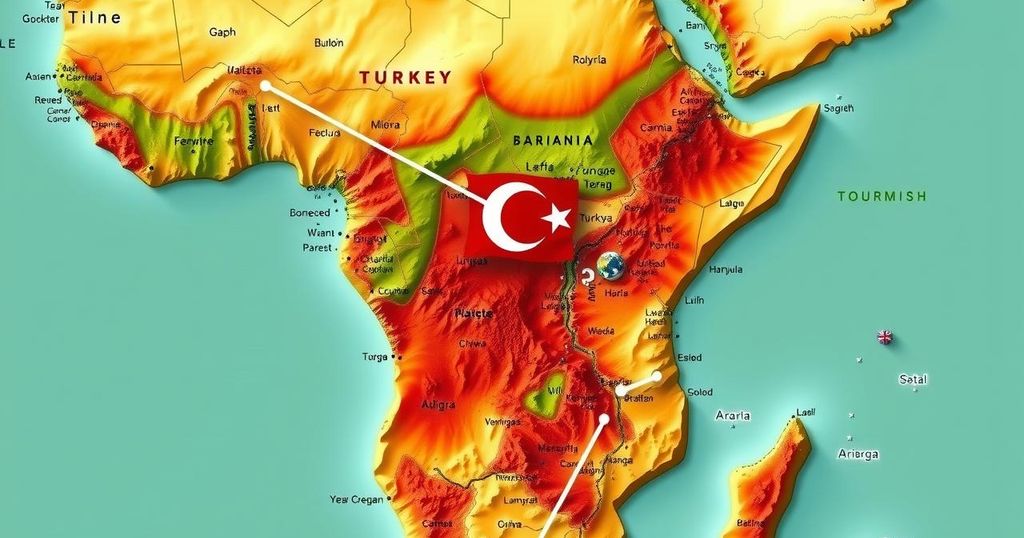Global news
ABECHE, AFRICA, ANKARA, CHAD, COTE D ’ IVOIRE, DONELLI, EL, ELEM TEPECIKOGLU, EUROPE, EUROPE/ASIA, EUROPEAN UNION, FEDERICO DONELLI, FRANCE, INTERNATIONAL RELATIONS, ISTANBUL, MOROCCO, NATO, REGIONAL COOPERATION, REGIONAL SECURITY, RFI, SA, SAHEL, SOCIAL SCIENCES UNIVERSITY, TE, TRIESTE UNIVERSITY, TURKEY, UNIVERSITY, WEST AFRICA
Jamal Walker
0 Comments
Turkey Aims for Expansion in Africa Amid French Military Withdrawal
Turkey is looking to exploit France’s military withdrawal from Africa to enhance its influence in the region. While investing heavily through military and diplomatic channels, experts warn that Turkey risks overstretching its resources. The changing dynamics in Africa favor Turkey’s expansion, yet sustainable engagement will be crucial for success.
Turkey is poised to seize opportunities in Africa following France’s military withdrawal from the Sahel and West Africa. As France reduces its military engagement, experts note that Turkey, leveraging its NATO membership and arms export experience, must tread carefully to avoid resource overstretch on the continent.
France’s retreat, which includes the handover of its base in Côte d’Ivoire and its exit from Chad, signifies a notable military retraction in the region. Federico Donelli, an international relations expert at Trieste University, highlights this shift, stating, “What we are living in now is a transformational age.” He elucidates that local states are driving traditional players like France away from the region. This changing landscape creates opportunities for nations such as Turkey.
President Recep Tayyip Erdogan has made significant investments in Africa, expanding Turkey’s embassy presence fourfold in the past twenty years. He utilizes the historical context of France’s colonial past to resonate with African audiences, fostering goodwill.
Elem Tepecikoglu from Ankara’s Social Sciences University posits that Turkey’s entrance into the African arena coincides with France’s inability to address insurgent threats in the Sahel. Criticism of French military efficacy has tarnished its image, allowing Turkey to present itself as a preferable partner.
Recent developments, such as strengthening military ties in Senegal and Turkey’s provision of advanced weaponry to countries like Nigeria, Mali, and Chad, underscore Turkey’s growing influence in the region. Tepecikoglu notes the appeal of Turkish defense products, which are often more economical and come with fewer restrictions than those of Western competitors.
While Turkey is a relatively minor player compared to larger powers like Russia and China, the geopolitical competition may favor its position in Africa. Donelli remarks that African states may find it politically advantageous to engage with Turkey as a NATO member compared to establishing ties with Russia.
However, Turkey’s rapid expansion, evident through its military commitments across Africa, raises concerns about overstretch. Professor Huseyin Bagci warns that as Turkey expands, it will face challenges due to limited military and economic capabilities. The quest for influence may not be sustainable if it exceeds manageable capacities, especially given the current economic troubles Turkey faces.
The dynamics of Turkey’s involvement in Africa necessitate a careful balance of expansion and sustainability. As analysts suggest, Turkey may need to consider collaboration rather than conflict to secure its interests in the region.
In conclusion, Turkey is strategically positioned to capitalize on France’s military withdrawal from Africa by enhancing its influence through diplomatic and military engagements. As it navigates this landscape, Turkey must be mindful of its resource limits to avoid overstretch. Engaging with Africa could present sustainable opportunities, especially given the shifting geopolitical environment favoring cooperative relationships. Ultimately, Turkey’s approach will be critical in determining its long-term success on the continent.
Original Source: www.rfi.fr




Post Comment